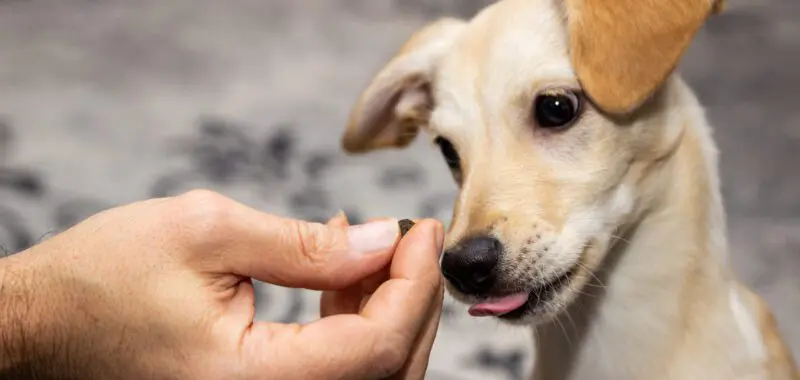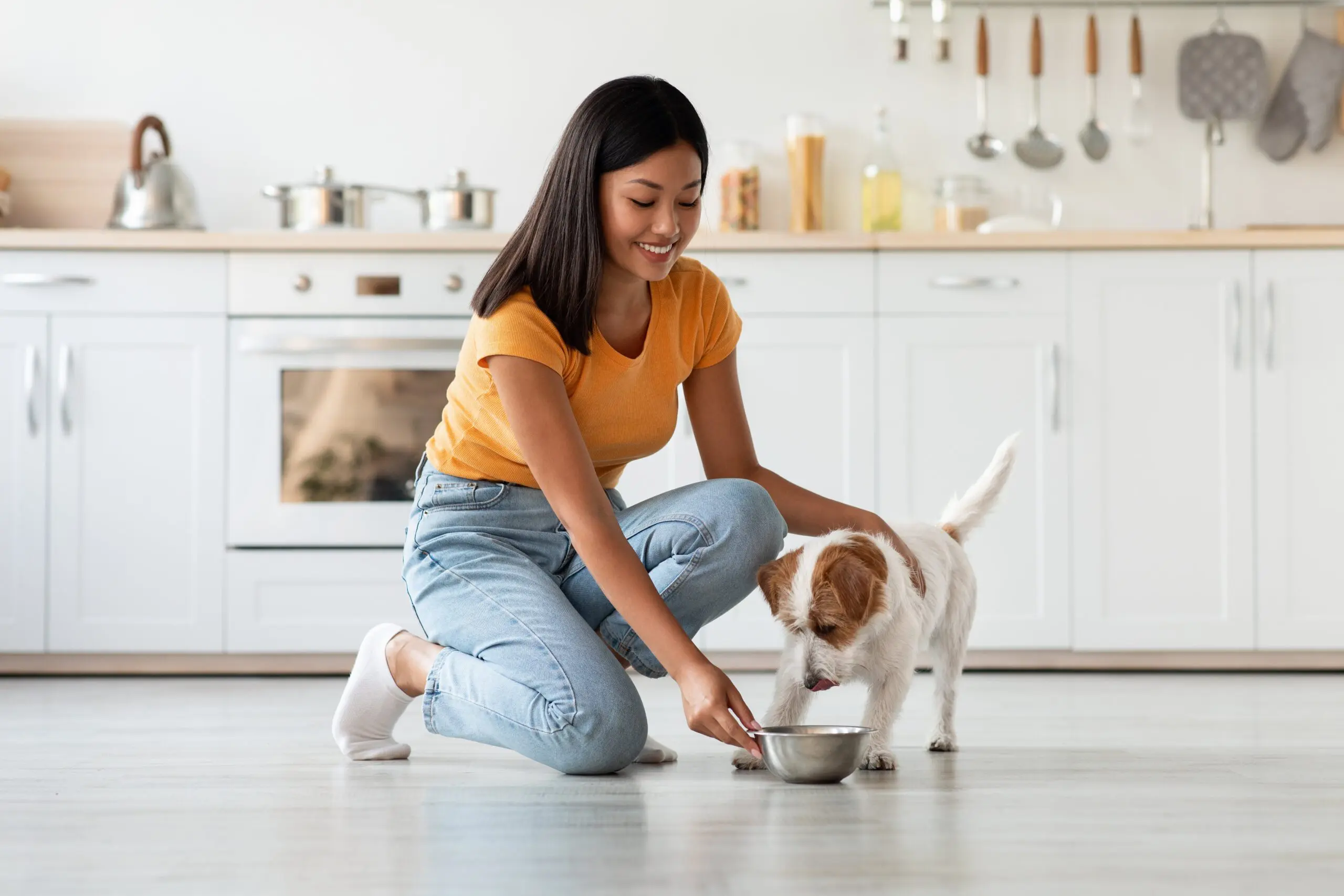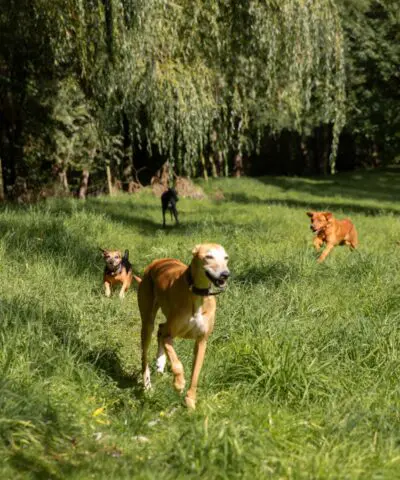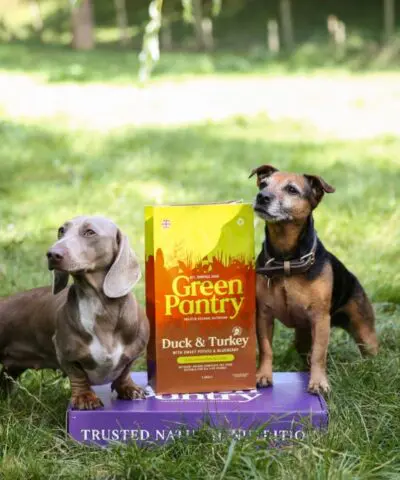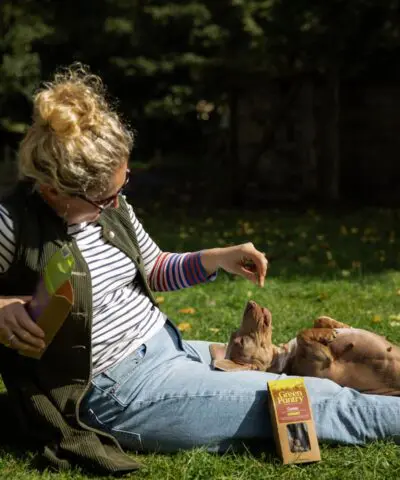Thinking of adopting a puppy? Then welcome to the exciting and wonderful world of puppy parenthood! Bringing a new puppy into your home is a joyous occasion, but it also comes with its responsibilities.
Join us here at Green Pantry where we’ll talk you through some of the most essential aspects of puppy care, from feeding them natural puppy food to regular grooming and pampering. We genuinely care about you and your pup’s new journey together, so let us be on board for this wild ride!
Let’s get into the ultimate puppy care guide…
How to care for a puppy – our top tips
Whether you’re getting your first puppy or just need a refresher course, we’ve got plenty of tips to get your puppy on the right track towards adulthood. After all, bringing a pup into your home will change your life forever, so it’s best to be prepared! There’s no denying that puppies are a lot of work, but they also bring a lot of joy to your world.
We’ll take you through the common puppy care essentials:
- Puppy training
- Puppy diet and feeding
- Puppy health
- Socialising and exercise
- Grooming and coat care
And some other tips and tricks that will transform your puppy into a well-established canine!
Feeding your pup
From the get-go, ensuring that your furry friend has a natural balanced diet is essential. A growing puppy needs the proper nutrients for their development, helping them to achieve healthy growth and minimise the potential for obesity.
Choosing the right puppy food and portion sizes
Here at Green Pantry, we know a thing or two about your puppy’s diet. As a general guideline, puppies thrive on diets of approximately 30%-35% protein and 15%-20% fat. We recommend looking for foods that prioritise whole meats or meat as the main ingredient. High-quality kibble with freshly prepared meat or fish is an excellent option for providing balanced nutrition – such as our Freshly Prepared Salmon with Sweet Potato and Veg puppy food.
Remember to follow the recommended feeding portions based on your puppy’s weight and age. Overfeeding can lead to joint problems and other health issues in the long run.
If you want more information in regards to feeding, check out our blog post: How Much Dry Food Should I Feed My Dog?
Adding supplements
Certain natural dog supplements can also help your puppy’s growth and development. Omega-3 fatty acids are important to support brain and eye development, while glucosamine and chondroitin contribute to joint health.
Remember – always consult with your veterinarian before adding supplements to your puppy’s diet.
Training your puppy
When it comes to training, think about the basics before you start to get ahead of yourself. Teaching your puppy to ‘sit’, ‘stay’, ‘come’, ‘down’, and ‘heel’ forms the foundations of obedience training. Remember, consistency is key, so ensure that everyone in your household is using the same commands.
It’s important to set your puppy up for when it starts to make an appearance in the outside world; unfortunately, not everyone loves dogs in the way that we do!
Positive reinforcement
When training your furry friend, positive reinforcement is the way to go. Use some of our delicious natural dog treats to effectively reward your puppy for good behaviour and encourage them to repeat it. Positive reinforcement can help to develop the bond between you and your puppy and help them to associate training with positive experiences.
On the other hand, avoid using punishment or negative reinforcements in training. These methods can create fear and mistrust in your puppy, hindering its progress and potentially damaging your relationship.
Dealing with accidents
Accidents happen, there’s no doubt about it. But when they do, it’s important to stay calm. There’s no need to scald your puppy – accidents are all part of the learning process. Use a pet-specific odour eliminator to clean up messes and remove tempting scents that might attract them back to the same spot.
Puppy health
Next on the list of this puppy care guide is their health, which is arguably the most important aspect of your new pooch. Regular vet visits for vaccinations and checkups will track your puppy’s growth and prevent various diseases.
Upon collecting your puppy, it’s also important to double-check that it has had its 8-week vaccination and booking it in for its 12-week vaccination. And, while it is the breeder’s responsibility to ensure the puppy has been microchipped, we recommend double-checking this one, too.
The importance of exercise for puppies
Just like humans, regular exercise is super important for a puppy’s overall health and development. It helps your puppy to stay at a healthy weight, strengthens their body, and keeps their mind sharp. It’s also essential in monitoring weight control and preventing obesity.
Going for walks, playing, and training sessions can boost their obedience skills, socialisation, and increase their bond with you and your family. Remember, a tired puppy is very often a happy puppy! Just make sure that you adjust the right amount of exercise based on their age, size, and breed so that they don’t overdo it.
Grooming your puppy
When it comes to puppy care, grooming is something that can often be overlooked. Grooming isn’t just about keeping your puppy looking its best, but it’s also crucial for their health and overall well-being.
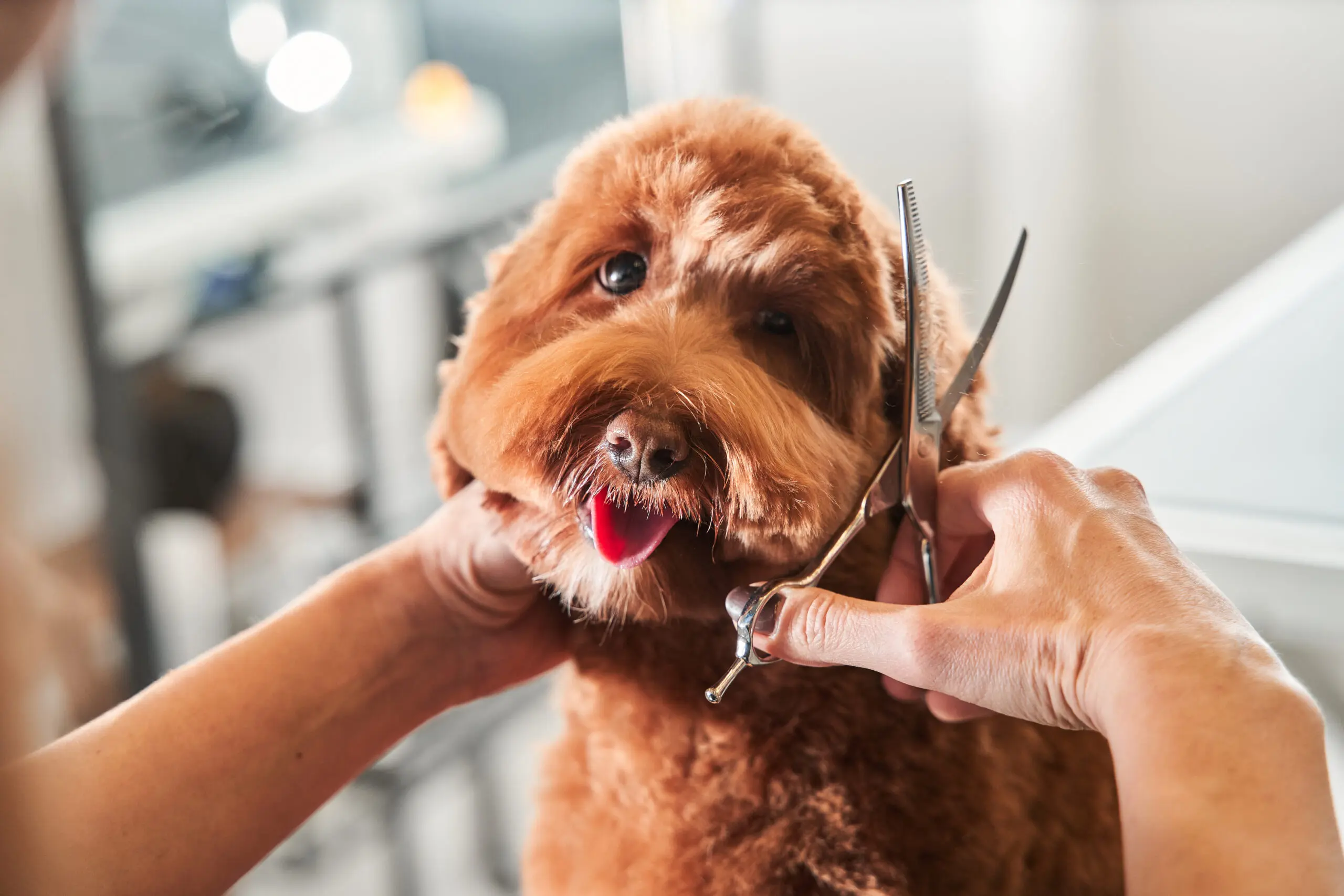
Regular puppy care and grooming
Start your grooming routines early so that your puppy gets used to it. Regular brushing, based on their coat type, will help to keep their skin healthy and shiny. You should also check and clean their ears to prevent any infections. Keeping their nails trimmed to a comfortable length is essential, too.
Dental health hygiene is also extremely important, so remember to brush your pup’s teeth with dog-specific toothpaste or give them treats that are good for their teeth and gums. And, of course, bathing should be done as needed, using gentle puppy-friendly shampoo.
“I recommend getting your puppy used to the grooming experience as early as possible. There will always be a mix of dogs, some who love grooming, and some who don’t. So, the more regularly they come and get groomed, the more they are relaxed about it.” – Laura Denby, professional dog groomer.
Read our full expert interview with Laura here!
Tips for bringing your puppy to the workplace
If you’re lucky enough to be able to take dogs and puppies to work, we have some advice to make it a smooth experience for all. First of all, make sure that your workplace is dog-friendly. Bring a comfy bed for them to relax in, and always pack chew toys to keep them entertained. Remember to plan your lunches during your workday, as regular walks and routine is key!
Tips for dealing with separation anxiety
New puppies are prone to feel some sort of anxiety, especially as they are introduced to an unfamiliar home with new smells, sounds, and people. We understand that dealing with separation anxiety and excessive crying can be challenging, however, there are some ways to make them feel more relaxed.
Create a safe space for your puppy, whether that’s a cosy crate or a puppy pen. You could also leave them with a treat-filled toy to keep them busy or comforted when you do have to step away for a few hours.
Invest in your pup’s health with Green Pantry!
Hopefully, this comprehensive guide has taught you all you need to know about puppy care. Your puppy relies on guidance, care, and love, and our top tips will help you nurture a healthy, friendly, and well-behaved dog. Make sure to cherish every moment and watch as your puppy grows into the heart and soul of your home!
Here at Green Pantry, we’re genuinely passionate about your dog and their health. That’s why we offer completely natural dog food that will help your pooch not only in their early pup stages but throughout the rest of their lives right up to their senior years.
For more information, please feel free to reach out – we’re always on standby to offer our expert advice and puppy care help. Or, call us on 01553 811320. We’d love to have you and your furry friend on board!
